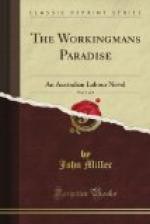“Oh, I have! It seems to me such a sin, such a shameful sin, to give life for the world that we have. I can understand it being a woman’s highest joy to be a mother. I have seen poor miserable women looking down at their puny nursing babies with such unutterable bliss on their faces that I’ve nearly cried for pure joy and sympathy. But in my heart all the time I felt that this was weakness and folly; that what was bliss to the mother, stupefying her for a while to the hollowness and emptiness of her existence, was the beginning of a probable life of misery to the child that could end only with death. And I have vowed to myself that never should child of mine have cause to reproach me for selfishness that takes a guise which might well deceive those who have nothing but the animal instincts to give them joy in living.”
“You will never have children?” asked Geisner.
“I will never marry,” she answered. “There is little you can teach a girl who has worked in Sydney, and I know there are ideas growing all about which to me seem shameful and unwomanly, excepting that they spare the little ones. For me, I shall never marry. I will give my life to the movement, but I will give no other lives the pain of living.”
“You will meet him some day, Nellie,” said Connie.
“Then I will be strong if it breaks my heart.” Ned often thought of this in after days. Just then he hardly realised how the girl’s words affected him. He was so breathlessly interested. Never had he heard people talk like this before. He began to dimly understand how it touched the Labour movement.
“You will miss the best part of life, my dear,” said Connie. “I say it even after what you have seen of that husband of mine.”
“You are wrong, Nellie,” said Geisner, slowly. “Above us all is a higher Law, forcing us on. To give up what is most precious for the sake of the world is good. To give up that which our instincts lead us to for fear of the world cannot but be bad. For my part, I hold that no door should be closed to woman, either by force of law or by force of conventionalism. But if she claims entrance to the Future, it seems to me that she should not close Life’s gate against herself.”
“I would close Life’s gate altogether if I could,” cried Nellie, passionately. “I would blot Life out. I would—oh, what would I not do? The things I see around me day after day almost drive me mad.”
There was silence for a moment, broken then by Connie’s soft laugh. “Nellie, my dear child,” she observed, “you seem quite in earnest. I hope you won’t start with us.”
“Don’t mind her, Nellie,” said Josie, softly, speaking for the first time. “Connie laughs because if she didn’t she would cry.”
“I know that,” said Nellie. “I don’t mind her. Is there one of us who does not feel what a curse living is?”
Geisner’s firm voice answered: “And is there one of us who does not know what a blessing living might be? Nellie, my girl, you are sad and sorrowful, as we all are at times, and do not feel yet God in all working itself out in unseen ways.”




